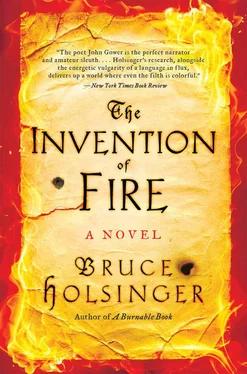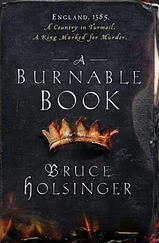Bruce Holsinger - The Invention of Fire
Здесь есть возможность читать онлайн «Bruce Holsinger - The Invention of Fire» — ознакомительный отрывок электронной книги совершенно бесплатно, а после прочтения отрывка купить полную версию. В некоторых случаях можно слушать аудио, скачать через торрент в формате fb2 и присутствует краткое содержание. Год выпуска: 2015, Издательство: HarperCollins, Жанр: Исторический детектив, на английском языке. Описание произведения, (предисловие) а так же отзывы посетителей доступны на портале библиотеки ЛибКат.
- Название:The Invention of Fire
- Автор:
- Издательство:HarperCollins
- Жанр:
- Год:2015
- ISBN:нет данных
- Рейтинг книги:3 / 5. Голосов: 1
-
Избранное:Добавить в избранное
- Отзывы:
-
Ваша оценка:
- 60
- 1
- 2
- 3
- 4
- 5
The Invention of Fire: краткое содержание, описание и аннотация
Предлагаем к чтению аннотацию, описание, краткое содержание или предисловие (зависит от того, что написал сам автор книги «The Invention of Fire»). Если вы не нашли необходимую информацию о книге — напишите в комментариях, мы постараемся отыскать её.
The Invention of Fire — читать онлайн ознакомительный отрывок
Ниже представлен текст книги, разбитый по страницам. Система сохранения места последней прочитанной страницы, позволяет с удобством читать онлайн бесплатно книгу «The Invention of Fire», без необходимости каждый раз заново искать на чём Вы остановились. Поставьте закладку, и сможете в любой момент перейти на страницу, на которой закончили чтение.
Интервал:
Закладка:
“With Gloucester’s approval?”
“More than his approval. It is Woodstock’s men who have been bringing it across and selling it here.”
“And you believe the king’s uncle conspires so openly against England’s interests?” I asked, hearing the skepticism in my own voice.
“What I believe is not of relevance. It is what I have seen that convinces me, and what my paid men up and down the coast have seen. With my own eyes I have witnessed Gloucester’s men unshipping kegs of saltpetre from a cog off Dunkirk, then rowing them into Burgundy’s maw.”
“How do you know they were Gloucester’s men?”
“They wore his bends, flew his colors off the ship.”
“What proof do you have?”
“Nothing written,” he conceded. “There is only my word, and this.”
He pulled a piece of cloth from somewhere in his coat. It was a heraldic bend, a band meant to be worn around the forearm, with a badge of embroidered kidskin sewn into the cloth. The badge itself was lozenge shaped, displaying two white swans, their wings spread wide, their linked necks collared in gold with a chain descending to entwine the birds’ webbed feet. The same bend described by poor Iseult.
“Where did you get this?”
He looked down at the badge. “In Dunkirk. I was watching one of the docks as an English ship unloaded. A cog, bearing a large shipment of saltpetre. Two of the men were arguing on the high quay. They were drunk, I believe, and the dispute involved a maudlyn they had hired to come aboard. It soon came to blows. Nothing murderous, just two sauced sailors swinging their arms, a bit of wrestling. But in the struggle one of them had his band ripped off his sleeve, and it fell to the ground. I waited until they’d left the quay, then went and retrieved it.”
I fingered the badge, the embroidered feathers and chain. I had seen dozens like it on the streets of London, and more recently in Gloucester’s castle in Kent, where the duke’s men had imprisoned Chaucer and me in the tower. The duke seemed to have an endless reserve of men. Hauling bodies on the Thames and through the streets of London, gunning down a market in the Pale, and now this.
“Did you ever speak to any of the company?” I asked.
“No,” he allowed. “I spoke to one of their buyers from Sluys, and learned that the arrangement has been going on for months. Since before Pentecost, he told me.”
“I can hardly bring myself to believe it, Simon. The Duke of Gloucester-”
“You must believe it, Father. I have seen it, and it can’t be denied that his men and Snell’s are involved in the highest treachery.”
“And killing all in their way,” I murmured, newly awake to my peril.
“Saltpetre and gunpowder are a mere portion of it, Father,” he said. “They are also trading in guns.” Simon stood and walked to a high pair of shelves by his door. He reached up, lifted a long object off the lower shelf, and brought it to me. It was a handgonne, of a similar length and heft to those I had fired at the Calais keep. A tubelike length of metal bolted to a carved wooden stock, a priming pan hammered into the barrel, a small hole bored through to the chamber.
There the similarities ended, I saw as I slipped on my spectacles. For unlike the Calais gun, a rough if lethal contrivance, this weapon had been crafted by a master artisan. The barrel was of bronze in an octagonal shape, widening slightly from bottom to top, the stock expertly fashioned to join the metal with a smooth seam. I suspected the barrel had been poured at a foundry rather than beaten and welded at a smithy, though I could not be sure.
The gun’s most distinctive feature was its firing mechanism. I rotated the weapon in the rushlight. Several inches from the butt end of the stock was a curved length of metal fashioned to resemble the spiraled tail of a snake. The twist of iron ended in a cleverly wrought snakehead, with a piece of cord held clenched between its fangs.
“The Snake,” said Simon, reaching forward to finger the serpentine mechanism.
The Snake. The same name Beauchamp had given to the gun rumored to be in development at the Tower. As Simon showed me the weapon’s parts I marveled at the ingenuity of this new gun in my hands. The center of the snake’s body had been attached to the gun with a hinged lever, the fulcrum sitting at the point where barrel met stock. By lifting the snake’s tail at the stock end, the user of the weapon would be lowering the serpent’s mouth-and thus the glowing cord-into the firing pan.
The gun could be both aimed and fired, then, by one man alone, without the need for a partner to light the priming powder with a coal, indeed without the use of a coal at all. Instead the powder would be set alight with a cord anchored between the snake’s teeth, and the gunner could run from place to place on the field of battle without relying on a stationary fire to light a coal or stick.
The Snake was a small revolution, a marvel of efficiency, a fierce and fell weapon. I wondered what other innovations were being imagined and engineered in the royal armory.
“How did you get this, Simon?”
“It was lifted from the same cog by one of my men at Dunkirk several days ago. He hooked over the side by night and found it wrapped in sailcloth belowdecks. I have two of them. This one is mine, to do with as I wish. The other is for you, to take back to the chancellor. I have already shortened it for ease of transport, though the snake is intact.”
He went to the shelf and brought over a stubby version of the same handgonne, with most of the barrel sawed roughly away. The wooden stock had been shortened as well, leaving the device no longer than my forearm. Simon took the gun from me and laid it carefully on the table between us.
“And now I have a question for you.” He leaned forward, his leg stilling beneath the table. “Who knows you are in Calais?”
“The chancellor, certainly, and his man Edmund Rune. Ralph Strode knew I was coming over as well, and of course Beauchamp.”
“Could Gloucester have been informed?”
“Not by the chancellor,” I said. “Yet Beauchamp is the duke’s close ally against the earl. He might have got word back across while I’ve been here, though the timing would be rather strait.”
“Perhaps,” he said.
I felt compelled to ask him, “Who is paying you, Simon? Who is your lord and master this year?” My voice sounded bitter, even to me.
“Hawkwood,” he answered instantly. “He pays me well to keep my fingers in the pies, and like him I am happy to sell what I know. In this case, however, I am offering it freely to you, and through you to the crown. To see this plot unfolding against my country and my king does not sit well, even to a man like me.”
Sir John Hawkwood, the great English mercenary who had made half of Italy his domain in recent decades, hiring his services to popes, cities, dukes. It was three years now since Simon had left London to join Hawkwood’s company. That he was still in the ruthless mercenary’s good graces after what transpired last year came as a rude surprise. I regarded him closely, wishing for a look at the workings in his head, as opaque to me as the mysterious gears in a clock tower.
“No man may serve two masters, Simon,” I said quietly, preachily.
He lowered his head to place his chin on his folded hands. He looked into the burning rushes as he spoke. “You have quoted only part of Matthew’s verse, Father. Allow me to turn the leaf for you. ‘ No man can serve two masters. For either he will hate the one, and love the other, or he will love the one, and despise the other. You cannot serve both God and mammon. ’” His eyes tilted up, hooded but clear, and he gave me a sad smile. “We have made our choice of master, Father. We are servants of mammon, you and I, our only difference lying in the source of our servitude. What men and their private affairs are to you, nations and their secrets are to me. Things to slip from purses and sell to strangers, with little regard for law or convention.”
Читать дальшеИнтервал:
Закладка:
Похожие книги на «The Invention of Fire»
Представляем Вашему вниманию похожие книги на «The Invention of Fire» списком для выбора. Мы отобрали схожую по названию и смыслу литературу в надежде предоставить читателям больше вариантов отыскать новые, интересные, ещё непрочитанные произведения.
Обсуждение, отзывы о книге «The Invention of Fire» и просто собственные мнения читателей. Оставьте ваши комментарии, напишите, что Вы думаете о произведении, его смысле или главных героях. Укажите что конкретно понравилось, а что нет, и почему Вы так считаете.












